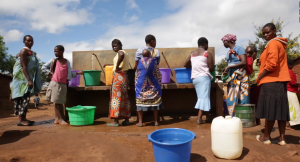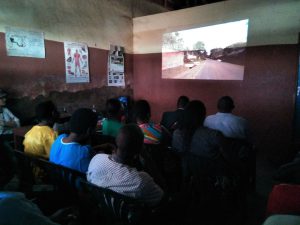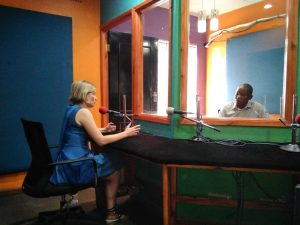Lilongwe Water Works? A research documentary on the dynamics of water provisioning and access in informal settlements
Dr. Maria Rusca – a Marie Sklodowska-Curie Research Fellow and Lecturer in Water and Development at our Geography Department at King’s College London – is the Principal Investigator of “Investigating Natural, Historical and Institutional Transformations in Cities (INHAbIT Cities)”, aiming at improving understandings of the dynamics of basic service provision in urban and suburban spaces in the global South. The project particularly investigates the relation between urban infrastructures, distribution of everyday risks and uneven conditions of access to water in Maputo (Mozambique) and Lilongwe (Malawi).
Maria believes that strong connection and commitment to a cause comes with inspiring stories; she has thus decided to engage with larger non-academic audiences and policy makers by disseminating INHAbIT’s research findings through a short documentary. “Lilongwe Water Works?” tells the stories of women accessing or providing water where the formal utility provides water through public water kiosks (see picture).

In addition to using her documentary intitled “Lilongwe Water Works?” as part of the education curriculum of Water and Development at King’s College London, and Water Governance at IHE Delft, Maria returned to Lilongwe a few weeks ago to share her findings at various events she organised.
The documentary was projected at the Water User Association in one of the informal settlements, where some community members, water users, and contributors to the documentary were able to discover and discuss the final output; the same was done in an informal settlement’s school; another projection was done at the Lingadzi Hotel, with water stakeholders (the World Bank, UNICEF, the Ministry of Water, Lilongwe Water Board, the Economic Justice Network, Lilongwe City Council, WASAMA) and journalists (Zodiac, Reuters, AFP, Free Expression institute, Times Group, Capital Radio, Nyasa Times).


The most impressive moment for Maria was to see how the documentary was able to raise debates and even confrontations in ways she had never experienced before. During these debates, concerns were raised about the role of Water Users Associations: while on the one hand they are considered to be useful in ensuring water supply, they are also causing water to low-income areas to become increasingly expensive and often unaffordable (see referenced papers at the end of the post).
To watch the documentary:
WATCH ON VIMEO: https://vimeo.com/240647554
DIRECTOR: Maria Rusca
YEAR: 2017
SYNOPSIS: The water utility in Lilongwe, capital city of Malawi, serves people living in low-income neighbourhoods through a system of water kiosks. The kiosks work like shops, which opening hours when people can go buy 20 litre buckets of water. This documentary tells the stories of the women and men that access water through the kiosks and those who are involved in running them. Their stories reveal both the successes and the failures of providing water through kiosks and call us to question whether this system can ensure the human right to water to the residents of Lilongwe’s peripheries and to others elsewhere in the world.
PRODUCER: Whales That Fly and Hyphen Media
FUNDING: This project has received funding from the European Union’s Horizon 2020 research and innovation programme under the Marie Sklodowska-Curie grant agreement No 656738
For related peer-reviewed papers:
- Tiwale S., Rusca M., Zwarteveen M., The power of pipes: mapping urban water inequities through the material properties of networked water infrastructures. The case of Lilongwe, Malawi, Water Alternatives, Water Alternatives 11(2): 314-335.
- Rusca, M., Schwartz K., Hadzovic, L., Ahlers R., (2015), Adapting Generic Models through Bricolage: Elite Capture of Water Users Associations in Peri-urban Lilongwe, European Journal of Development Research, Volume 27, Issue 5, pp 777–792. Doi: https://doi.org/10.1057/ejdr.2014.58
- Rusca M., Alda Vidal C., Hordijk M., Kral N., Bathing without water, and other stories of everyday hygiene practices and risk perception in urban low-income areas: the case of Lilongwe, Malawi, Environment and Urbanisation, doi: https://doi.org/10.1177/0956247817700291
- Alda Vidal C., Kooy M., Rusca M., (2018) Mapping operation and maintenance: an everyday urbanism analysis of inequalities within piped water supply in Lilongwe, Malawi,Urban Geography, Volume 39, Issue 1, pp. 104- 121 doi: https://doi.org/10.1080/02723638.2017.1292664
- Rusca M. and Schwartz K., (2018) The Paradox of Cost Recovery in Heterogeneous Municipal Water Supply Systems: Ensuring Inclusiveness or Exacerbating Inequalities?Habitat International, doi: https://doi.org/10.1016/j.habitatint.2017.03.002
- Sarpong Boakye-Ansah A., Ferrero G., Rusca M and van der Zaag P., (2016) Inequalities in microbial contamination of drinking water, supplies in urban areas: the case of Lilongwe, Malawi, Journal of Water and Health, Volume 14, Issue 5, pp. 851-863, doi: 10.2166/wh.2016.258
For related blogs:
Are we paying enough attention to water quality? https://flows.hypotheses.org/686
Bathing without water https://flows.hypotheses.org/659